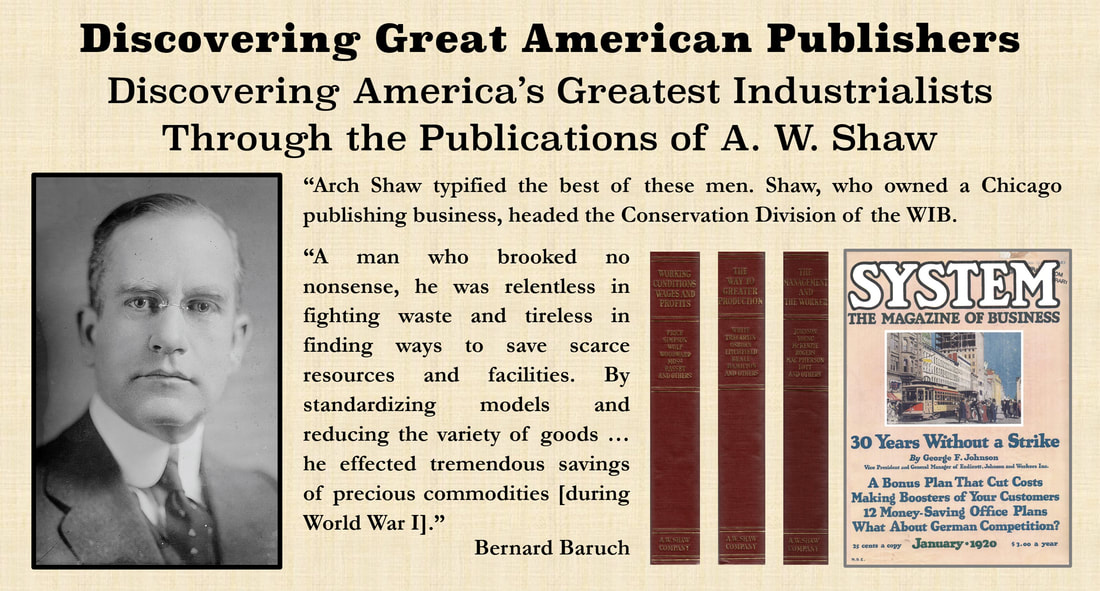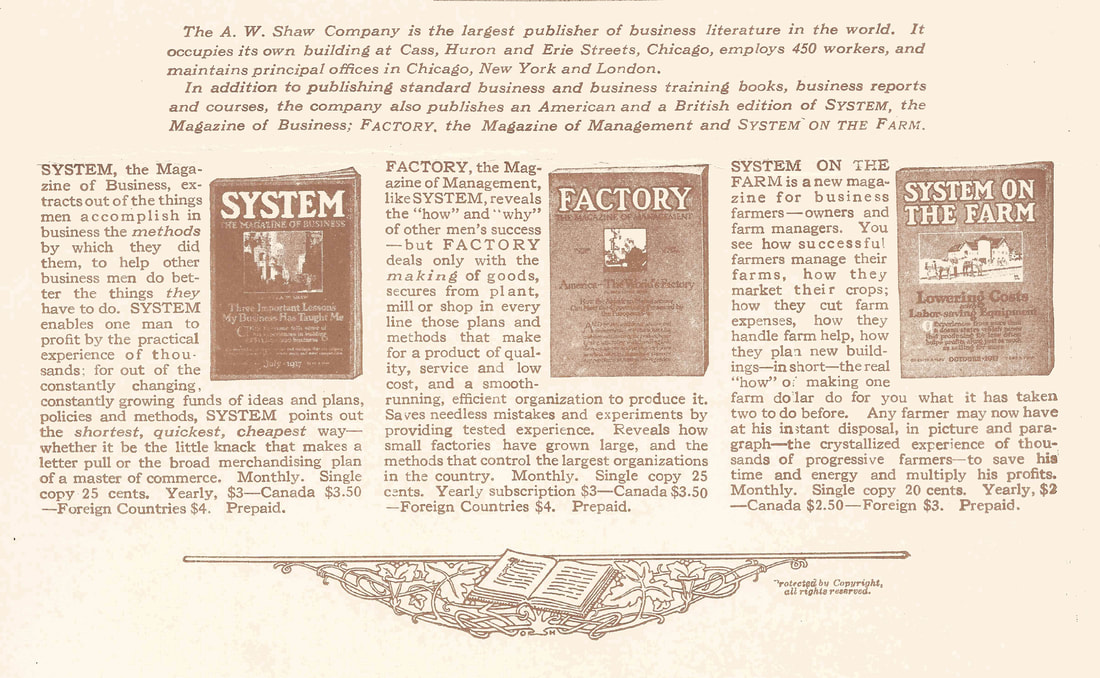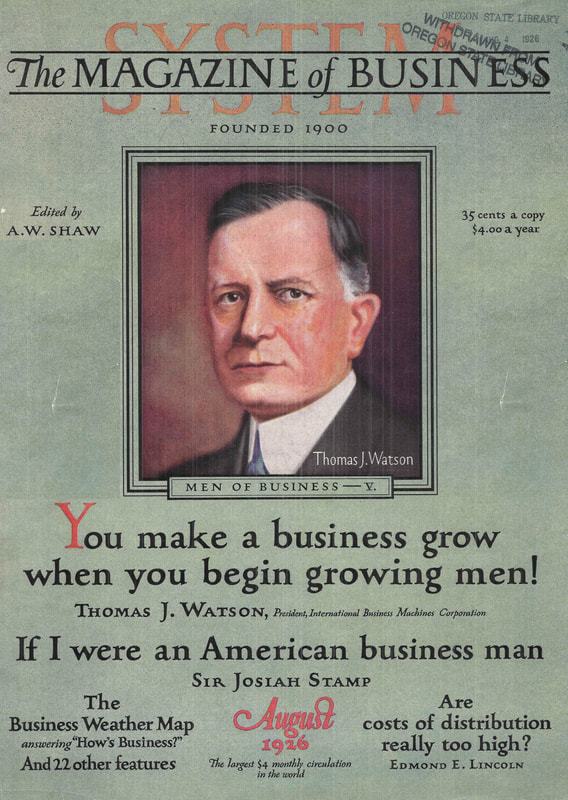A. W. Shaw's Books and Publisher Home Page
|
|
Date Published: July 3, 2021
Date Modified: February 18, 2024 |
B. C. Forbes style of writing was to understand the industrialists of the 20th Century and write about them—evaluate them. A. W. Shaw's style of publishing was to give the industrialists a platform from which to share their thoughts about what made a great corporation. Sound strange?
Only to 21st Century ears, as many of the 20th Century industrialists worked to grow their industries as a whole and, for lack of a better description, they believed that an incoming tide raises all boats. They wanted their industries to succeed and worked together to raise their individual boat along with all the others in their industry and country as a whole.
To A. W. Shaw, everyone was a student—and everyone a teacher, in this new system of "capitalism."
Only to 21st Century ears, as many of the 20th Century industrialists worked to grow their industries as a whole and, for lack of a better description, they believed that an incoming tide raises all boats. They wanted their industries to succeed and worked together to raise their individual boat along with all the others in their industry and country as a whole.
To A. W. Shaw, everyone was a student—and everyone a teacher, in this new system of "capitalism."
Peter E. Greulich
Magazine Publications of A. W. Shaw
- Discovering Great American Industrialists through A. W. Shaw's Works
A. W. Shaw Published Three Magazines with a Purpose
From inside the dust cover of the book "The Way to Greater Production," the following overview describes three of A. W. Shaw's publications and their very targeted audiences, themes and purposes: (1) "System, the Magazine of Business," (2) "Factory, the Magazine of Management," and (3) "System on the Farm."
System: The Magazine of Business
|
A. W. Shaw was an amazingly prolific publisher, well-known editor, and entrepreneur. Through System, The Magazine of Business, which he edited from 1900 through 1927, he published some of America's greatest iconic industrialists. One of the interviewing journalists for this publication was Samuel Crowther, who is also covered in this bibliography of Great American Industrialists.
The distinguishing characteristic of System was the openness with which the industrialists shared their insights with their peers.
Individuals that shared their business knowledge with fellow industrialists were the likes of: Henry Ford, Harvey S. Firestone, A. B. Farquhar, George F. Johnson and Thomas J. Watson Sr. [shown in the image in the sidebar]. Much of this material was then organized and published in book format for the general public. Bernard M. Baruch wrote the following of A. W. Shaw and his work on the War Industry Board during World War I:
|
Tom Watson: "System: The Magazine of Business"
|
"Men such as Charles MacDowell, Donald McLennan, Charles Otis, George Armsby, Albert Brunker, Arthur Whiteside, Charles Carroll, Everett L. Crawford, Samuel P. Bush, and others, too numerous to mention, put aside private interests—often at considerable sacrifice—to serve the government.
"Arch Shaw typified the best of these men. Shaw, who owned a Chicago publishing business, headed the Conservation Division of the WIB. A man who brooked no nonsense, he was relentless in fighting waste and tireless in finding ways to save scarce resources and facilities. By standardizing models and reducing the variety of goods that had no other purpose than to satisfy fashion whims, he effected tremendous savings of precious commodities."
Bernard M. Baruch, The Public Years
Book Publications of A. W. Shaw
- Discovering the Beliefs of Great 20th Century American Industrialists
1917: "Handling Men"
|
"A good executive finds, develops and leans upon those who can carry forward for him the
increasing divisions of his single great work. . . . |
"The proverbial reluctance to allow those to enter the water whom we would have swim has given short measure to many a success."
1920: The Companion Series
|
"These three companion volumes are designed to present a complete picture of the common problems that arise in handling human relations in any business, large or small.
|
The relations between employers and employees are today so practical, the points ordinarily at issue between them have been defined so often and so completely, and so much experience has accumulated in handling the problems, that the only satisfactory treatment today seems to be an analysis of methods actually being used and proving successful."
- The Way to Greater Production
|
"The task of management here, so far as the human factors go, is obviously twofold:
|
- To assist the worker to get the training he needs, so that he may become conscious of his real abilities.
- To offer the proper incentives, so that the worker will go ahead and do the best work there is in him.
- The Management and the Worker
|
Common sense is a group trait, however lacking it may be in individuals. And industrial groups, by and large, though they may quarrel with methods in detail, want intelligent leadership in the offices of management.
|
They want vigor used in the exercise of policies; and of course, above all, they insist on fairness in determining policies and in distributing the proceeds of industry.
- Working Conditions, Wages and Profits
|
"Below a reasonable point, hours cannot profitably be reduced. But down to a certain point, conclusive experience demonstrates, they can. . . .
|
''In reaching final conclusions on the most desirable arrangement of hours-of-work schedules, there must be taken into account not merely production, but also the question as to what schedule of hours will, in the long run, (1) best maintain the productive period of the worker's life, (2) help his self-development, (3) promote the welfare of the community, and generally (4) raise the standard of citizenship among industrial workers."






